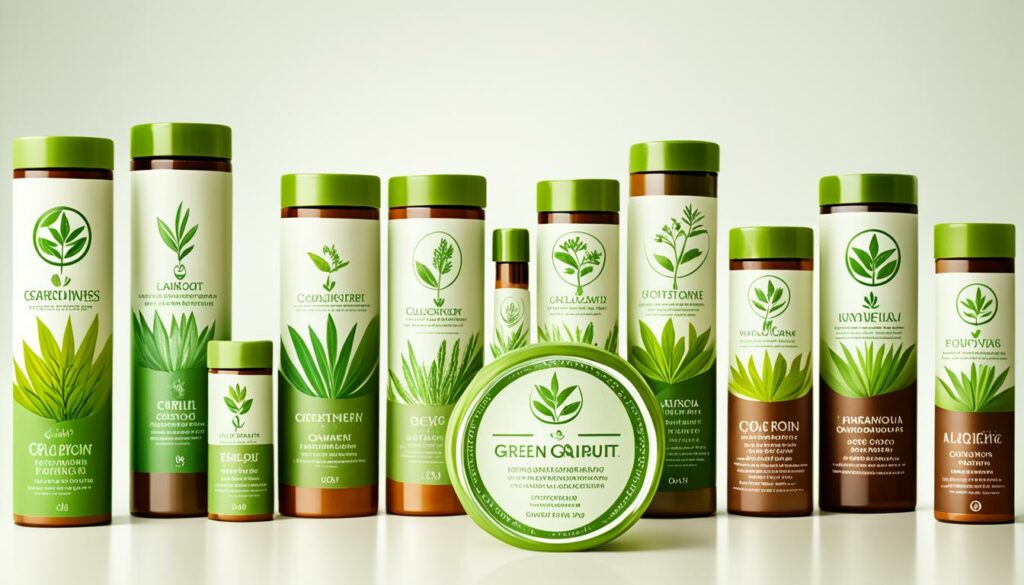Are you searching for a natural alternative to conventional medicine? Curious about the healing power of herbal remedies? Look no further! In this article, we’ll explore the world of herbal treatments, uncovering their benefits, safety considerations, and how to incorporate them into your wellness plan.
From ancient herbal traditions to modern holistic healing practices, herbal medicine has long been used to address common ailments, promote well-being, and enhance overall vitality. But how effective are these herbal remedies? How can we ensure their safety? Let’s dive into the world of herbal treatments and discover the natural path to wellness.
Understanding Herbal Remedies
Herbal remedies have long been used as alternative medicine and natural remedies to treat various conditions. Unlike pharmaceutical drugs, herbal remedies are not classified as medicines and are not subjected to the same regulations.
While herbal therapy and holistic healing practices have gained popularity, it is important to note that the effectiveness and safety of herbal remedies are not always scientifically proven. The use of herbal medicine is often based on traditional knowledge and anecdotal evidence.
“Natural forces within us are the true healers of disease.” – Hippocrates
It is crucial to approach herbal remedies with caution and be aware of their limitations. Scientific studies exploring the efficacy and safety of herbal remedies are often lacking, making it difficult to validate their claims. Furthermore, because herbal remedies are not regulated like medicines, there is a risk of undisclosed ingredients or contaminants in herbal products.
To be a smart consumer and ensure safe use, it is important to follow guidelines for using herbal remedies:
- Consult with a qualified healthcare provider before incorporating herbal remedies into your healthcare routine.
- Do thorough research on specific herbs and their potential interactions with medications.
- Choose herbal products from reputable companies that adhere to certifications for purity and quality.
- Be mindful of misleading labels and exaggerated claims, as they can be prevalent in the herbal remedies market.
Benefits of Herbal Remedies
Despite the lack of extensive scientific evidence, many individuals find herbal remedies beneficial for managing certain health conditions. The approach of using natural remedies resonates with those seeking holistic wellness.
Some popular herbal remedies include:
| Herb | Common Uses |
|---|---|
| St. John’s Wort | Used for mild to moderate depression |
| Chamomile | Known for its calming properties, often used for anxiety and sleep support |
| Echinacea | Believed to boost the immune system for colds and respiratory infections |
| Ginger | Used for its anti-inflammatory properties and to aid digestion |
| Valerian | Popular for promoting relaxation and improving sleep quality |
It is important to note that everyone’s body chemistry is different, and what works for one person may not work for another. It is always advisable to consult with a healthcare provider to determine the appropriateness and safety of herbal remedies for individual needs.

Remember, understanding herbal remedies involves an informed and cautious approach. By being aware of their limitations and potential risks, you can make informed decisions about incorporating herbal remedies into your healthcare routine.
Safety Considerations When Using Herbal Supplements
When incorporating herbal supplements into your wellness routine, it is crucial to prioritize safety and take necessary precautions. Unlike regulated medicines, herbal supplements are not subjected to rigorous testing or regulations. This means that their effectiveness, quality, and safety may vary.
One primary safety concern is the potential interaction between herbal supplements and other medications. Since herbs contain active compounds that can interact with pharmaceutical drugs, it is essential to consult with a healthcare provider before starting any herbal supplement regimen, especially if you are already taking prescribed medications.
Another consideration is the safety of herbal supplements for specific populations, including children, pregnant or breastfeeding women, and older adults. Limited research exists on the safety and effectiveness of herbal supplements in these groups, so seeking professional guidance is advised.
Interactions with Medications
Herbal supplements can interact with prescription or over-the-counter medications, affecting their potency or potentially causing unwanted side effects. Therefore, it is crucial to inform your healthcare provider about any herbal supplements you are taking or planning to take. They can evaluate any potential interactions and determine the best course of action for your specific needs.
Herbal Supplements and Children
Children have unique physiological characteristics that may make them more susceptible to the effects of herbal supplements. Additionally, their developing bodies may react differently to various compounds. It is recommended to consult a pediatrician or healthcare provider before giving herbal supplements to children, as their safety and appropriateness may vary based on age and individual factors.
Herbal Supplements and Age
As we age, our bodies undergo changes that can impact how we metabolize medications and supplements. The safety and effectiveness of herbal supplements may vary in older adults due to factors such as liver or kidney conditions and potential interactions with existing medications. Consulting with a healthcare provider or geriatric specialist is essential to determine the suitability of herbal supplements for older adults.

When it comes to incorporating herbal supplements into your wellness routine, it is always best to err on the side of caution. Consulting with a healthcare provider who has expertise in herbal medicine can provide personalized guidance and ensure the safe use of herbal supplements.
Choosing and Using Herbal Remedies Safely
When it comes to incorporating herbal remedies into your wellness routine, it’s important to be a discerning consumer. With countless products on the market, it’s crucial to choose wisely and ensure their safety and effectiveness. Here are some essential tips for selecting and using herbal remedies:
Evaluating Herbal Product Claims
Many herbal products make extravagant claims about their benefits for various health conditions. However, it’s important to approach these claims with caution and skepticism. Always look for scientific evidence to support these claims and consult reliable sources such as peer-reviewed research studies or reputable health websites. Ensure that the information you find is accurate and backed by scientific research.
Remember, just because a product is labeled as “natural” or “herbal,” it doesn’t automatically guarantee its effectiveness or safety. Companies can sometimes exaggerate product claims or mislead consumers. Being an informed consumer will help you make better choices in selecting herbal remedies.
Certifications for Herbal Products
One way to ensure the quality and safety of herbal remedies is to look for certifications on the product label. Certifications such as “USP Verified” or “ConsumerLab.com Approved Quality” indicate that the product has undergone testing for purity and quality by reputable organizations. These certifications provide consumers with confidence that the herbal product meets certain standards.
For example, the USP Verified mark ensures that the herbal supplement contains the ingredients listed on the label in the declared amounts. It also verifies that the product is free from harmful contaminants. Similarly, the ConsumerLab.com Approved Quality seal signifies that the herbal product has passed rigorous testing for quality and authenticity.
When considering herbal remedies, look for products with these certifications to increase the likelihood of getting a high-quality product.
Consulting with Healthcare Providers
Prior to trying any herbal remedies, it’s crucial to consult with your healthcare provider. They can provide personalized advice based on your specific health needs and ensure that the herbal remedies are safe to use, especially if you have any pre-existing medical conditions or are currently taking medications.
Your healthcare provider can also help assess the potential interactions between herbal remedies and any prescribed medications you may be taking. They can provide guidance on suitable dosage, potential side effects, and monitor your progress to ensure optimal results.
Thorough Research and Reliable Sources
Thorough research is essential when it comes to choosing and using herbal remedies. Always read reviews from reputable sources and rely on evidence-based information. Look for scientific studies, meta-analyses, or expert opinions from healthcare professionals or herbal practitioners.
Consider the reputation and credibility of the source before relying on the information provided. Reputable health websites, academic institutions, herbal associations, and trusted experts can provide reliable insights into the effectiveness and safety of herbal remedies.
Remember that everyone’s body is unique, and what works for one person may not work for another. It’s important to find the right herbal remedies based on your individual needs and preferences. Patience and a willingness to try different options are key in discovering what works best for you.
| Key Points to Remember: |
|---|
| Be cautious of extravagant claims made by herbal products |
| Look for certifications such as “USP Verified” or “ConsumerLab.com Approved Quality” to ensure product quality |
| Consult with a healthcare provider before using herbal remedies |
| Conduct thorough research and rely on reliable sources |

By following these guidelines, you can choose and use herbal remedies safely and effectively for your well-being. Remember that herbal remedies are not a replacement for medical care and should be used in conjunction with professional guidance. Embrace the benefits of herbal remedies while prioritizing your health and safety.
Herbal Supplements and Specific Health Conditions
Herbal supplements are a popular choice for addressing specific health conditions. From menopausal symptoms to immune support, there are several common herbal supplements known for their effectiveness. It’s important to note that while herbal remedies can offer potential benefits, consulting with a healthcare provider is crucial to ensure their safety, effectiveness, and appropriate dosage.
Here are some widely used herbal supplements and the specific health conditions they are often relied upon for:
| Herbal Supplement | Health Condition |
|---|---|
| Black Cohosh | Menopausal symptoms |
| Echinacea | Boosting the immune system |
| Ginkgo Biloba | Improving memory and circulation |
| Ginseng | Energy and stress relief |
| Saw Palmetto | Prostate health |
| St. John’s Wort | Mild to moderate depression |

It’s crucial to remember that while these herbal supplements are commonly used, individual experiences and responses may vary. To ensure the best possible outcomes, consult with a healthcare provider who can provide personalized advice based on your specific health needs and consider any potential interactions with existing medications. Together, you and your healthcare provider can determine the most suitable herbal supplements and appropriate dosages for your health condition.
Incorporating Herbs Into Your Wellness Plan
Enhance your overall well-being by incorporating herbs into your wellness plan. Discover the safe herbs that promote general well-being and explore the various herbal preparations and traditions.
Safe Herbs for General Wellness
When it comes to incorporating herbs into your wellness plan, certain herbs are considered safe and beneficial for general well-being. These herbs include:
- Chamomile – known for its calming properties and promoting relaxation
- Tulsi (Holy Basil) – used in Ayurvedic medicine to reduce stress and boost the immune system
- Echinacea – known for its immune-enhancing properties and often used to prevent and treat the common cold
- Elderberry – rich in antioxidants and commonly used for immune support
- Ginger – revered for its anti-inflammatory properties and digestive benefits
- Valerian – used to promote relaxation and improve sleep quality
These herbs can be easily incorporated into your daily routine to support your overall well-being.
Herbal Preparations
Herbs can be utilized in various forms, allowing for a diverse range of preparations. Some common herbal preparations include:
- Infusions – These are made by steeping herbs in hot water to create herbal teas. They are a popular way of consuming herbs and enjoying their therapeutic benefits.
- Tinctures – This is a concentrated liquid form of herbs extracted using alcohol or a glycerin base. Tinctures are commonly used for their convenience and long shelf life.
- Powders – Finely powdered herbs can be added to smoothies, beverages, or incorporated into recipes to add flavor and enhance nutritional content.
- Capsules – This is a convenient way of consuming herbs, as capsules contain powdered herbs enclosed in a shell. They are easy to take and can be standardized for consistent dosages.
- Poultices – A poultice involves applying herbs directly to the skin, often in the form of a paste, to address specific ailments or promote healing.
- Balms – Herbal balms combine herbs with a base such as beeswax or oil to create topical ointments for soothing and nourishing the skin.
Experiment with different herbal preparations to find the ones that resonate with you and fit seamlessly into your wellness routine.
Herbal Traditions and Approaches
Herbal medicine has deep roots in various cultures and traditions worldwide. Some prominent herbal traditions include:
- Indigenous Traditional Medicine – Native cultures have rich herbal knowledge passed down through generations, focusing on the interconnectedness of nature and health.
- African Herbalism – African traditional healers have a profound understanding of local plants and their medicinal properties, incorporating botanicals into holistic healing practices.
- Ayurveda – Originating in India, Ayurveda emphasizes creating balance and harmony through personalized herbal formulations, diet, lifestyle, and body-mind connection.
- Traditional Chinese Medicine (TCM) – TCM utilizes a combination of herbs, acupuncture, and other holistic therapies to restore the body’s balance and promote well-being.
- Western Herbal Medicine – This tradition draws on historical European and American herbal knowledge, combining ancient wisdom with modern scientific understanding.
- Naturopathy – Naturopathic medicine incorporates botanicals along with other natural modalities to support healing and prevent disease.
Each herbal tradition offers unique insights and approaches to herbal medicine. It is essential to do thorough research and consult with knowledgeable practitioners to gain a deeper understanding of these traditions and their respective herbal formulations.

The Importance of Quality and Sourcing
When it comes to herbal remedies, the quality and sourcing of herbs play a crucial role in their effectiveness and safety. High-quality herbs that are ethically and sustainably sourced not only ensure their potency but also minimize the environmental impact.
Different herbal traditions have specific methods of processing herbs to preserve their quality and enhance their therapeutic properties. For example, Ayurvedic herbal processing involves techniques like drying, grinding, and decocting to extract the maximum benefits from the plants.
Furthermore, some herbs are best sourced from their natural habitat to retain their unique properties. Wild-foraged herbs, carefully and responsibly harvested from their native environments, can offer exceptional quality and potency.
Ethical sourcing is also important when it comes to herbal products. Supporting companies that prioritize responsible sourcing practices ensures that the herbs are obtained in a sustainable and socially responsible manner. Look for certifications like Fair Trade or organic certifications, as they indicate a commitment to ethical practices.
Understanding the tradition and context of herbal medicine is key to appreciating the quality and effectiveness of herbs. By exploring herbal sourcing practices and learning about different herbal traditions, you can gain valuable insights into the quality of the herbs you’re using.
Benefits of Ethically Sourced Herbs
Ethically sourced herbs offer numerous benefits:
- Greater potency and effectiveness
- Sustainable harvesting and conservation of plant species
- Protection of biodiversity and natural ecosystems
- Support for local communities and fair trade practices
The Impact of Ethical Sourcing
| Benefits | Examples |
|---|---|
| Greater potency and effectiveness of herbs | Wild-foraged St. John’s wort, ethically sourced gingko biloba |
| Sustainable harvesting and conservation | Organically grown echinacea, responsibly sourced black cohosh |
| Protection of biodiversity and ecosystems | Wild-crafted turmeric, ethically sourced ginseng |
| Support for local communities | Fair trade certified ashwagandha, sustainably sourced tulsi |
By prioritizing the quality and sourcing of herbs, you can ensure that you’re receiving the full benefits of herbal medicine while supporting sustainable practices and ethical standards.

Finding What Works for You
When it comes to herbal medicine, there is no one-size-fits-all solution. Each person’s health journey is unique, and what works for one individual may not work for another. That’s why it’s essential to approach herbal remedies with an open mind and a willingness to explore different methods.
As you embark on your personal health journey, consider working with a qualified herbal practitioner. Their expertise can provide valuable guidance and ensure that you use herbs safely and effectively to address your individual needs. A qualified herbal practitioner will take into account your specific health concerns, preferences, and any existing medical conditions, tailoring the treatment to suit you.
Remember that finding the right herbs and herbal preparations may require some trial and error. What works for others might not be the perfect fit for you. Be patient and listen to your body as you navigate through the process. Pay attention to how different herbs make you feel and keep track of any changes or improvements in your well-being. Through this personal exploration, you’ll discover the herbs and herbal combinations that work best for your individual health.
So, embrace your personal health journey and trust yourself along the way. With the support of a qualified herbal practitioner and the willingness to try different approaches, you’ll find the herbal remedies that resonate with your body and contribute to your overall well-being.

